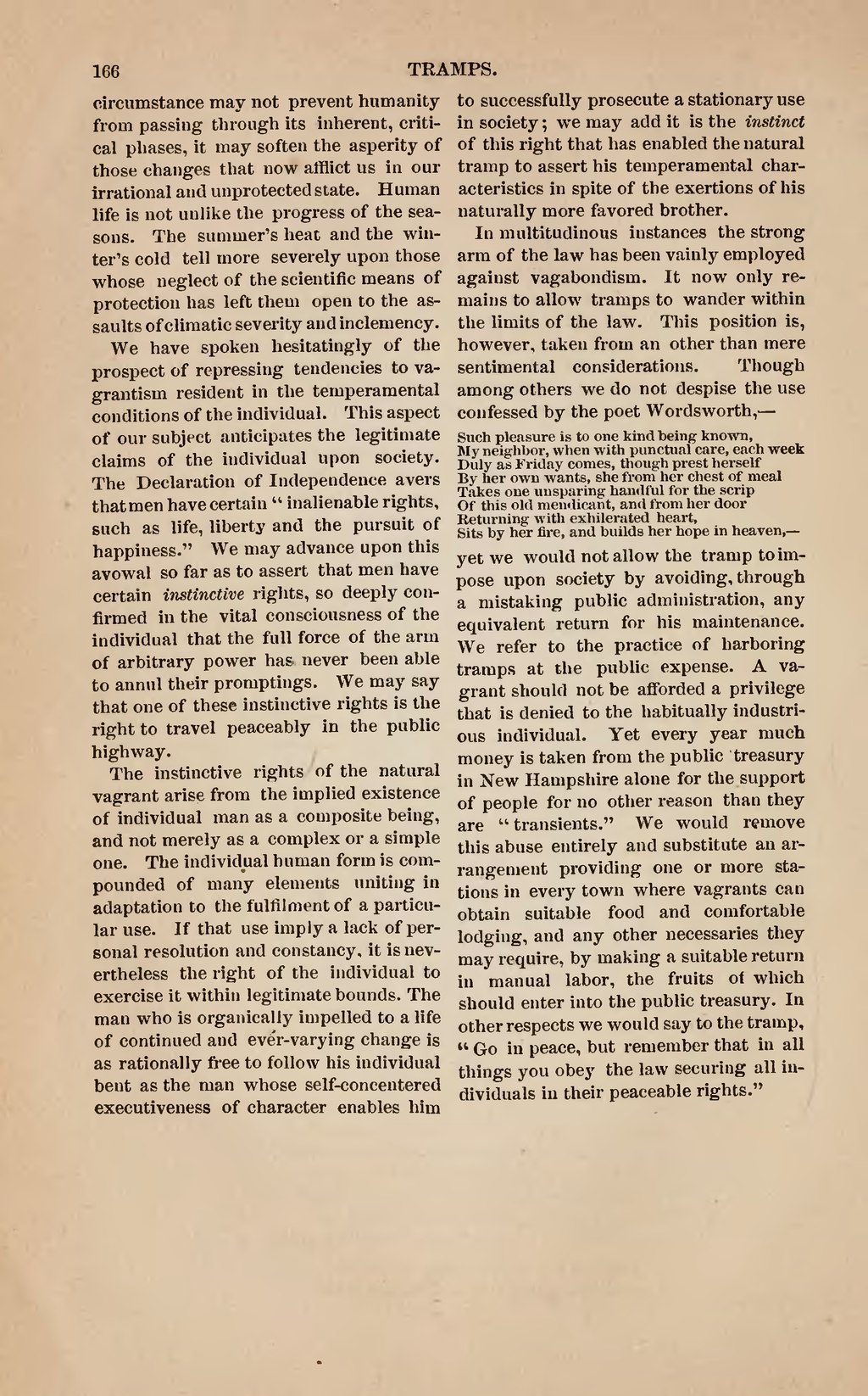166
��TRAMPS.
��circumstance may not prevent humanity from passing through its inherent, criti- cal phases, it may soften the asperity of those changes that now afflict us in our irrational and unprotected state. Human life is not unlike the progress of the sea- sons. The summer's heat and the win- ter's cold tell more severely upon those whose neglect of the scientific means of protection has left them open to the as- saults of climatic severity and inclemency.
We have spoken hesitatingly of the prospect of repressing tendencies to va- grantism resident in the temperamental conditions of the individual. This aspect of our subject anticipates the legitimate claims of the individual upon society. The Declaration of Independence avers that men have certain " inalienable rights, such as life, liberty and the pursuit of happiness." We may advance upon this avowal so far as to assert that men have certain instinctive rights, so deeply con- firmed in the vital consciousness of the individual that the full force of the arm of arbitrary power has never been able to annul their promptings. We may say that one of these instinctive rights is the right to travel peaceably in the public highway.
The instinctive rights of the natural vagrant arise from the implied existence of individual man as a composite being, and not merely as a complex or a simple one. The individual human form is com- pounded of many elements uniting in adaptation to the fulfilment of a particu- lar use. If that use imply a lack of per- sonal resolution and constancy, it is nev- ertheless the right of the individual to exercise it within legitimate bounds. The man who is organically impelled to a life of continued and ever-varying change is as rationally free to follow his individual bent as the man whose self-concentered executiveness of character enables him
��to successfully prosecute a stationary use in society ; we may add it is the instinct of this right that has enabled the natural tramp to assert his temperamental char- acteristics in spite of the exertions of his naturally more favored brother.
In multitudinous instances the strong arm of the law has been vainly employed against vagabondism. It now only re- mains to allow tramps to wander within the limits of the law. This position is, however, taken from an other than mere sentimental considerations. Though among others we do not despise the use confessed by the poet Wordsworth, —
Such pleasure is to one kind being known,
My neighbor, when with punctual care, each week
Duly as Friday comes, though prest herself
By her own wants, she from her chest of meal
Takes one unsparing handful for the scrip
Of this old mendicant, and from her door
Returning with exhilerated heart,
Sits by her fire, and builds her hope in heaven,—
yet we would not allow the tramp to im- pose upon society by avoiding, through a mistaking public administration, any equivalent return for his maintenance. We refer to the practice of harboring tramps at the public expense. A va- grant should not be afforded a privilege that is denied to the habitually industri- ous individual. Yet every year much money is taken from the public treasury in New Hampshire alone for the support of people for no other reason than they are " transients." We would remove this abuse entirely and substitute an ar- rangement providing one or more sta- tions in every town where vagrants can obtain suitable food and comfortable lodging, and any other necessaries they may require, by making a suitable return in manual labor, the fruits of which should enter into the public treasury. In other respects we would say to the tramp, " Go in peace, but remember that in all things you obey the law securing all in- dividuals in their peaceable rights."
�� �
